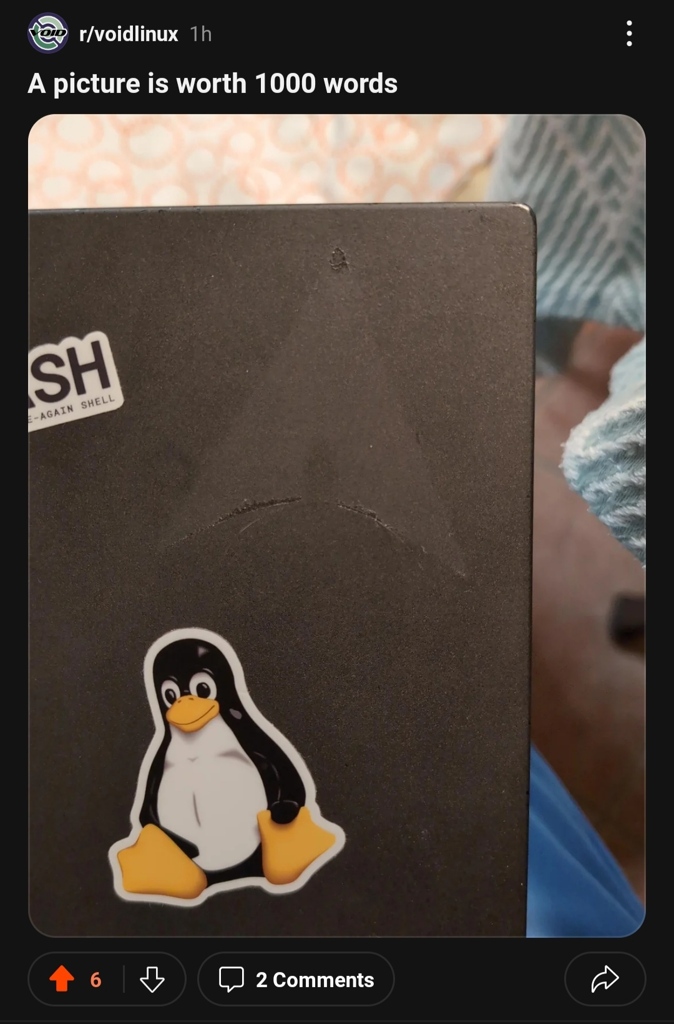this post was submitted on 26 Mar 2024
873 points (95.9% liked)
linuxmemes
21251 readers
1514 users here now
Hint: :q!
Sister communities:
- LemmyMemes: Memes
- LemmyShitpost: Anything and everything goes.
- RISA: Star Trek memes and shitposts
Community rules (click to expand)
1. Follow the site-wide rules
- Instance-wide TOS: https://legal.lemmy.world/tos/
- Lemmy code of conduct: https://join-lemmy.org/docs/code_of_conduct.html
2. Be civil
- Understand the difference between a joke and an insult.
- Do not harrass or attack members of the community for any reason.
- Leave remarks of "peasantry" to the PCMR community. If you dislike an OS/service/application, attack the thing you dislike, not the individuals who use it. Some people may not have a choice.
- Bigotry will not be tolerated.
- These rules are somewhat loosened when the subject is a public figure. Still, do not attack their person or incite harrassment.
3. Post Linux-related content
- Including Unix and BSD.
- Non-Linux content is acceptable as long as it makes a reference to Linux. For example, the poorly made mockery of
sudoin Windows. - No porn. Even if you watch it on a Linux machine.
4. No recent reposts
- Everybody uses Arch btw, can't quit Vim, and wants to interject for a moment. You can stop now.
Please report posts and comments that break these rules!
founded 1 year ago
MODERATORS
you are viewing a single comment's thread
view the rest of the comments
view the rest of the comments

Does it support glibc while it supports musl?
Yes. From their website:
"Patching incompatible software"
What does that mean? If glibc is supported why there is a portability issueand requirement of patches?
Presumably so it can work with either libc implementation.
I have checked the void website and it does NOT support glibc. Here is it:
Wait edit: there is musl variant and glibc variant..
musl practices very strict and minimal standard compliance. Many commonly used platform-specific extensions are not present. Because of this, it is common for software to need modification to compile and/or function properly. Void developers work to patch such software and hopefully get portability/correctness changes accepted into the upstream projects.
Proprietary software usually supports only glibc systems, though sometimes such applications are available as flatpaks and can be run on a musl system. In particular, the proprietary NVIDIA drivers do not support musl, which should be taken into account when evaluating hardware compatibility.
glibc chroot
Software requiring glibc can be run in a glibc chroot.
Well if glibc is supported all glibc softwares must work right?? Patching the software to support musl would not be needed if it does support glibc
Even if it's supported, it doesn't mean it needs to be installed in every system. If the user wants to use a Musl-based system, the software working only on glibc needs to be patched. At least that's how I understood these statements.
Some patches are there for software that reauires systemd or parts of it.
But the Void Linux team specifically wants to support both glibc and musl
They are likely referring to musl. Patches might be needed for some programs to work with musl.
Not just musl, software that depends on systemd (or parts of it) as well.
We also need to patch binaries as well sometimes 😁. It is fun though, cutter and/or iaito are great tools.
Yes, there are basically 2 builds for every architecture. One is glibc, the other is musl. I haven't used the musl builds that much, just toyed with them a few times (mainly because of lack of software), but if you only use open source software that doesn't specifically depend on the GNU toolchain, yes, you can daily drive it, no doubt there. And yes, it is faster than the glibc builds.
Yeah different builds. Not what i expected